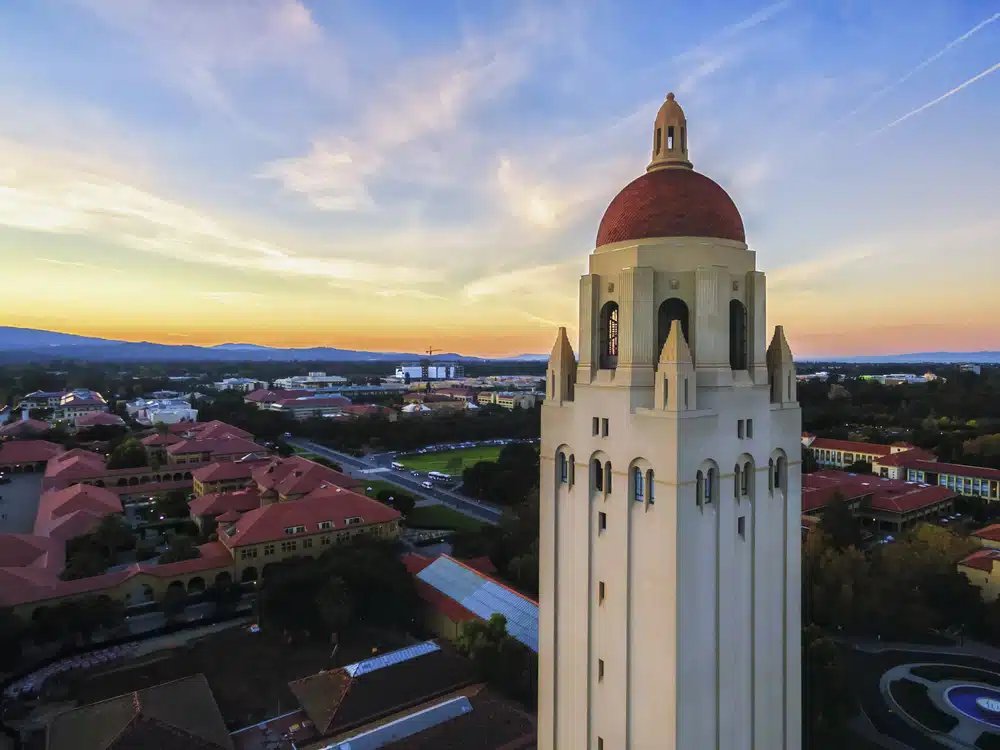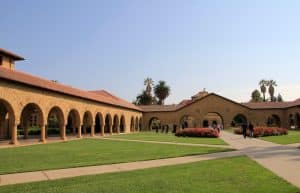The Stanford Earth Young Investigators High School Internship Program
Are you a high school student passionate about environmental sciences and looking for an extraordinary summer experience? The Stanford Earth Young Investigators High School Internship Program might be just what you’re searching for. This exceptional program, hosted by the prestigious Stanford Doerr School of Sustainability, offers a unique blend of classroom learning, field trips, and real scientific research opportunities.
Originally designed for in-person, one-on-one mentorships, the program has adapted to an online format, expanding its reach to more students than ever. This summer, you could be among the lucky few who dive deep into the world of environmental sciences, engage in cutting-edge research, and possibly even contribute to scientific publications as a high school student.
What is the Stanford Earth Young Investigators High School Internship Program?
The Stanford Earth Young Investigators High School Internship Program is an innovative and educational opportunity for high school students, especially those with a keen interest in environmental sciences. Hosted by the Stanford Doerr School of Sustainability, this program is not your average summer course. It’s an in-depth, hands-on learning experience that melds classroom instruction with real-world research in a dynamic and engaging environment.
Originally designed as an in-person mentorship, the program has adapted to a virtual format, a change spurred by the restrictions imposed during the COVID-19 pandemic. This transition to online learning has had an unexpected benefit: it has allowed a greater number of students to participate. More than 90 high schoolers, instead of the typical 10 to 20, have been able to log onto Stanford Earth’s new online education program, engaging in research opportunities from the comfort of their homes.
The core of the program lies in its research-centric approach. Students get a rare chance to delve into topics like climate change, the physics of hurricanes, and the sustainability of ecosystems. The program includes a mix of lectures, interactive sessions, and practical exercises, all led by Stanford Earth scientists. The sessions are designed to be both educational and thought-provoking, encouraging students to engage actively with the material and the scientific community.
Another unique aspect of the Stanford Earth Young Investigators program is its focus on producing actual scientific research. For instance, a group of students from the program has contributed to a study published in a peer-reviewed journal, a rare achievement for high school students. This opportunity to participate in genuine research gives students a real taste of what it’s like to be a scientist, from formulating hypotheses to conducting analyses and interpreting data.
The program is specifically targeted at local high school students in the Bay Area, emphasizing Stanford’s commitment to serving its community. It also aims to be inclusive, offering stipends to underrepresented, low-income students, or those who would be the first generation in their family to attend college.
Will the Program Resume Being an In-Person Mentorship?
The Stanford Earth Young Investigators High School Internship Program is set to return in the summer of 2024. Although the specific details regarding its format (whether it will be in-person or continue online) are not explicitly mentioned on their official site, it’s suggested to stay tuned for updates in mid-January.
The program traditionally involves local high school students working in research labs under the supervision of graduate students, postdocs, and lab managers, offering various areas of focus and activities like talks, lab tours, and field trips. For more details and updates, it’s recommended to check the Stanford Doerr School of Sustainability’s website regularly.
Where Does the Stanford Earth Young Investigators High School Internship Program Take Place?
The Stanford Earth Young Investigators High School Internship Program is primarily based at the Stanford University campus, located in Stanford, California. This program offers local high school students the chance to work in research laboratories at the university, under the guidance of Stanford’s graduate students, postdocs, and lab managers.
The focus is on engaging these young students in real scientific research, making it an enriching experience that combines practical lab work with educational activities like group talks, lab tours, and field trips. The setting at Stanford University provides a vibrant and academically stimulating environment for participants.
How to Apply to the Stanford Earth Young Investigators Program
Here’s a guide on how to apply for the Stanford Earth Young Investigators High School Internship Program, considering the changes brought about by the pandemic and potential alterations for the upcoming year:
1. Stay Informed: As of now, the details for the 2024 program are not fully available. Keep an eye on Stanford’s official website for updates. Checking around mid-January is advisable, as the program is set to return in the summer of 2024.
2. Understand the Program’s Format: Historically, the program offered in-person mentorship experiences in various fields like geology, environment, and energy. However, due to COVID-19, the program transitioned to an online format. This change expanded access, allowing more students to participate through virtual lectures and activities. The program has included a variety of topics, such as climate change, the physics and chemistry of hurricanes, and lithium-ion batteries technology.
3. Prepare for a Virtual or Hybrid Experience: While the program initially shifted entirely online due to the pandemic, future iterations might include elements of both in-person and virtual experiences. Be ready for a potentially hybrid format, combining online lectures with possible on-campus activities.
4. Application Process: The application process for the internship program typically involves submitting an application form, which may include personal details, academic information, and interest areas. The exact requirements and submission process will be detailed on Stanford’s official site once the program for 2024 is announced.
5. Anticipate Changes: It’s crucial to understand that the program’s structure and application process might undergo significant changes in the upcoming year. Therefore, it’s essential to regularly check for the latest information and be adaptable to new application procedures or program formats.
6. Plan Ahead: Given the popularity and competitive nature of the program, it’s wise to prepare in advance. Gather any necessary documents, think about your areas of interest within Earth and environmental sciences, and be ready to articulate your enthusiasm and how the program aligns with your academic and career goals.
The Stanford Earth Young Investigators program offers a unique opportunity for high school students to delve into environmental sciences. Whether it’s through a virtual platform or in-person mentorship, participating in this program can be a significant step towards achieving academic aspirations, especially for those interested in Earth sciences and sustainability.
Remember, the details for 2024 are still forthcoming, so keep an eye on the Stanford Doerr School of Sustainability website for the most current information. Stay enthusiastic, flexible, and prepared for a potentially evolving application process and program structure.
Why Should I Participate in the Internship Program?
Participating in the Stanford Earth Young Investigators High School Internship Program offers several benefits that can significantly impact your academic and career trajectory. Firstly, it provides early exposure to real scientific research, which is rare at the high school level. This experience not only bolsters your college applications but also gives you a clearer understanding of what a career in science entails.
The program, held at the prestigious Stanford University, allows you to work in well-equipped research laboratories, giving you a glimpse into the day-to-day life of scientific inquiry. Being mentored by graduate students, postdocs, and lab managers, you gain insights and guidance from those already deeply involved in their scientific careers. This mentorship is invaluable as it offers you personalized guidance, feedback on your work, and perhaps most importantly, inspiration from those who are already walking the path you might choose.
In addition to hands-on lab experience, the program includes a series of educational talks, lab tours, and field trips. These activities are designed to broaden your understanding of earth and environmental sciences, exposing you to various subfields and cutting-edge research topics. This exposure can be crucial in helping you decide your specific areas of interest for future studies or research.
Collaborating with peers who share your interest in science fosters a sense of community and belonging in the scientific world. This networking is not just beneficial for your present educational journey, but it also lays the foundation for future collaborations and professional relationships.
Moreover, the program’s focus on real-world research means you could contribute to studies that may be published in scientific journals. Having your name associated with such research as a high school student is a rare honor and an impressive accomplishment that sets you apart in the world of academia.
Furthermore, the program’s location in the Bay Area, known for its vibrant scientific community and technological innovation, offers additional opportunities for enrichment. Being in such an environment, even for a short period, can be incredibly motivating and eye-opening.
Finally, the program’s commitment to diversity and inclusion ensures a welcoming environment for all students. Whether you’re from an underrepresented background, a first-generation college aspirant, or just passionate about science, the program offers an equal opportunity for you to learn, grow, and excel.
Developing Essential Skills Through Internships
When you’re a student, internships can be more than just a checkbox on your resume. They are crucial for developing skills that textbooks alone can’t teach. Internships provide a unique environment where you can cultivate professional skills and understand the dynamics of the workplace. Let’s explore how these experiences can shape your skillset and future career.
1. Professional Skills Development: Internships are your gateway to the professional world. Here, you learn the ropes of your chosen field in a practical setting. You’ll find out how businesses operate, the importance of deadlines, and the value of team collaboration. This experience is vital; it’s where you transform theoretical knowledge into practical skills.
For example, if you’re in a marketing internship, you’ll get hands-on experience with real marketing campaigns. You might be involved in everything from brainstorming sessions to executing plans. This not only enhances your understanding of marketing strategies but also develops your creativity and problem-solving skills.
2. Communication and Networking: Effective communication is the backbone of any successful career, and internships are an excellent place to hone this skill. You’ll learn to articulate your ideas clearly, present your work confidently, and engage in professional conversations. You’ll also learn the art of email and report writing, which are indispensable in the corporate world.
Furthermore, internships expand your professional network. You meet industry professionals, mentors, and fellow interns. These connections can be invaluable as you advance in your career. They can offer advice, recommend you for positions, or even become your colleagues in the future.
3. Time Management and Organization: Juggling tasks and deadlines is a common scenario in any job. During your internship, you’ll learn to manage your time effectively and organize your workload. This skill is crucial for maintaining a good work-life balance and for being efficient in your professional life.
For instance, you might have multiple projects to handle simultaneously. Learning to prioritize tasks and manage your time effectively will not only help you meet deadlines but also reduce stress.
4. Adaptability and Learning Attitude: No matter your field of study, adaptability is a key skill. Internships often put you in situations where you need to learn quickly and adapt to new challenges. Whether it’s mastering a new software tool or adjusting to a different team dynamic, your ability to adapt is crucial.
Moreover, internships instill a continuous learning attitude. You’re exposed to new ideas, processes, and technologies. Embracing these learning opportunities will keep you relevant and competitive in your field.
5. Problem-Solving and Critical Thinking: In the real world, problems don’t come with a textbook solution. Internships give you a chance to face real-world challenges and think critically to find solutions. You learn to analyze situations, weigh options, and make decisions that can have a real impact.
For example, if you’re interning in a tech company and there’s a glitch in the software, you’ll learn how to troubleshoot issues, often under pressure. This experience sharpens your problem-solving skills, which are invaluable in any career.
6. Gaining Industry-Specific Skills: Internships are tailored to specific industries, allowing you to gain industry-relevant skills. If you’re in finance, you might work on financial models; in journalism, you might write articles under tight deadlines. These skills are what make you a valuable asset to future employers.
7. Understanding Workplace Culture: Every workplace has its culture, and understanding it is key to professional success. Internships provide a firsthand experience of how companies operate, their values, and their work environment. This understanding helps you navigate your future workplaces more effectively.
Overall, internships are a crucial step in your professional journey. They offer a unique combination of learning, skill development, and networking opportunities. By the end of your internship, you’ll not only have a better understanding of your chosen field but also a set of transferable skills that will benefit you throughout your career. Remember, it’s not just about getting work experience; it’s about transforming yourself into a skilled and adaptable professional.
What are the Societal and Industry Relevance of This Internship Program?
Firstly, it’s important to understand that we live in a world increasingly shaped by environmental and earth sciences. From climate change and renewable energy to natural resource management, the fields you’ll be exposed to in this program are at the forefront of addressing some of the most pressing global challenges.
As a participant, you’ll gain hands-on experience in these critical areas, providing you with a foundational understanding of the science behind major environmental issues. This knowledge is not only academically enriching but also socially significant, as it equips you to contribute to informed discussions and decisions about environmental policies and practices in the future.
In terms of industry relevance, the skills and knowledge you acquire are highly valued in various sectors. Companies and organizations across the globe are increasingly seeking individuals who understand environmental systems and can contribute to sustainable practices. Your experience in this program could open doors to careers in research, environmental consulting, sustainable business practices, or government policy, to name a few.
Moreover, the Stanford Earth Young Investigators Program fosters critical thinking, data analysis, and collaborative skills, all of which are highly sought after in the job market. These skills are transferable across disciplines and industries, making them invaluable regardless of the career path you choose.
Furthermore, the networking opportunities provided by the program are significant. Interacting with Stanford researchers, graduate students, and peers can lead to long-term professional relationships and mentorships. These connections can be beneficial as you navigate your academic and career journey.
Overall, the program offers you a unique opportunity to engage deeply with topics that are not only academically stimulating but also of great societal and industry importance. The experience you gain will not only enrich your understanding and appreciation of the earth and environmental sciences but will also position you favorably for future educational and career opportunities in a world increasingly centered around sustainability and environmental consciousness.
How Can the Stanford Earth Young Investigators High School Internship Program Help With My College Admissions Experience?
The Stanford Earth Young Investigators High School Internship Program is an exceptional opportunity that can significantly bolster your college admissions experience. If you’re wondering how this program can help you as you navigate the complex world of college applications, let’s break it down into detailed aspects.
1. Showcasing Your Passion for Science: Participating in the Stanford Earth program demonstrates a clear interest and dedication to the field of Earth and environmental sciences. When you apply to colleges, this experience signals to admissions officers that you have a genuine passion for the subject. It’s one thing to express interest in your personal statement, but quite another to show that you’ve actively pursued this interest through such a prestigious program.
2. Gaining Hands-On Research Experience: Many high school students lack real-world research experience, which is where this program gives you an edge. By participating, you get to work on actual research projects, gaining valuable skills and insights that are typically reserved for college students. This experience not only enriches your understanding of the field but also demonstrates to colleges that you are capable of handling advanced, college-level work.
3. Developing Critical Thinking and Problem-Solving Skills: The program pushes you to think critically and solve real-world problems. These skills are highly valued in higher education and beyond. When you can discuss in your college essays how you approached a specific research problem and what you learned from the experience, it illustrates your ability to think deeply and creatively – qualities that colleges look for in prospective students.
4. Enhancing Your Academic Profile: Your participation in the program is an academic accolade that enriches your profile. It shows that you’ve gone above and beyond the standard high school curriculum. This is particularly beneficial if you’re applying to schools with competitive science programs, as it sets you apart from other applicants.
5. Building Professional Relationships: Through the program, you have the chance to build relationships with professionals and academics in the field. These connections can be invaluable for your future, potentially leading to strong letters of recommendation. A recommendation from a mentor in the program, who can speak to your scientific acumen and dedication, can be a powerful addition to your college application.
6. Expanding Your Perspective on Earth Sciences: The program exposes you to various aspects of Earth and environmental sciences, broadening your understanding and perspective. This expanded knowledge base can make your college essays more compelling, as you’ll be able to draw on a wider range of experiences and insights.
7. Demonstrating Commitment and Perseverance: Participating in such a program requires dedication and hard work. It’s a significant commitment, and successfully completing it shows that you have the perseverance and time-management skills necessary to succeed in a demanding college environment.
8. Providing a Talking Point in Interviews: If you have college interviews, your experiences in the Stanford Earth program can serve as a rich talking point. Discussing your internship experiences can help you articulate your interests, your academic journey, and your future goals more effectively.
9. Preparing for College-Level Work: The skills and knowledge you gain from the program not only enhance your college applications but also prepare you for the rigors of college-level work. This can make your transition to college smoother and more successful.
For example, the internship program may teach you how to write an effective research paper, how to analyze data, and how to present your findings in a clear and concise manner. These skills are essential for success in college, where you will be expected to complete a variety of complex assignments.
10. Inspiring Your Future Academic and Career Path: Finally, the program might inspire your future academic pursuits or career path. This clarity of purpose can be compelling in a college application, as it shows you have a clear direction and are committed to pursuing your goals.
Participation in this program is not just about adding another line to your resume; it’s about growing as a student and a scientist, ready to take on the challenges of higher education and beyond.
Effective Time Management Strategies for Interns
Effective time management is a vital skill for interns, as it allows you to make the most of your internship experience while balancing other responsibilities. Here’s a detailed look at some strategies you can employ to manage your time effectively:
1. Understanding Your Responsibilities: Grasping the full scope of your role is foundational. This involves more than just reading a job description. Engage actively with your supervisor to understand the nuances of your tasks. Ask questions like, “What does success look like for this task?” or “Are there any specific benchmarks you’re expecting me to hit?” This proactive approach not only clarifies your role but also shows your eagerness to perform effectively.
2. Prioritizing Tasks: Once you’re clear on what needs to be done, you need to determine the order of importance. Consider factors like deadlines, the amount of work involved, and the impact of each task. The Eisenhower Matrix can be particularly useful here. For example, if you have a report due tomorrow (urgent and important), it should be prioritized over a long-term project (important but not urgent).
3. Creating a Schedule or To-Do List: Organizing your tasks visually aids in keeping track of them. A daily to-do list can help you focus on immediate tasks, while a weekly schedule provides a broader view of what’s coming up. Digital tools can be extremely helpful, offering reminders and allowing you to rearrange tasks as priorities shift. The key is to review and update your list or schedule regularly.
4. Setting Realistic Goals: Goal setting is an art. SMART goals (Specific, Measurable, Achievable, Relevant, Time-bound) provide a framework for setting effective goals. For instance, instead of vaguely aiming to ‘work on a project,’ set a goal like, ‘complete the first section of the project by Friday.’ This clarity makes the goal more tangible and achievable.
5. Avoiding Procrastination: Procrastination is a common challenge. Techniques like the Pomodoro Technique can be very effective. You work in short, focused bursts (25 minutes is standard), followed by a brief break. This method helps maintain high levels of concentration while preventing burnout. It’s also important to understand what triggers your procrastination – whether it’s a particular type of task, the time of day, or a certain environment – and develop strategies to combat these triggers.
6. Learning to Say No: It’s important to understand your limits. Overcommitting can lead to subpar work and burnout. If you’re already swamped, it’s okay to politely decline additional tasks or to ask for an extension. You can say something like, “I would love to help with this, but given my current workload, I won’t be able to deliver the quality of work expected. Can we possibly revisit this next week?”
7. Using Technology Wisely: Technology can be a double-edged sword. Use it to your advantage by choosing tools that enhance productivity. For instance, project management tools like Asana can help track your tasks, while apps like Focus@Will can provide music that enhances concentration. On the flip side, be mindful of how you use social media and other potential distractions.
8. Communicating Effectively: Clear communication is key to efficient time management. It involves not only asking questions and seeking clarifications but also updating your team on your progress. Regular check-ins with your supervisor can help ensure you’re on track and can provide opportunities for feedback.
9. Reflecting and Adjusting: Reflection is an often overlooked aspect of time management. Regularly take time to assess what’s working and what’s not. Maybe you find you’re more productive in the mornings – you can then schedule your most challenging tasks during this time. Adjust your strategies based on these reflections.
10. Balancing Work and Personal Time: Finally, remember that your internship is just one part of your life. It’s important to maintain a balance. Make sure you’re setting aside time for relaxation and activities that you enjoy. This balance is crucial for maintaining long-term productivity and avoiding burnout.
By mastering these skills, you can make the most of your internship experience, contributing significantly to your host organization while still maintaining a healthy work-life balance. Remember, the habits you develop during your internship will serve you well throughout your career, so take this time to cultivate effective time management strategies.
The Impact of Internship Programs on Academic Performance
Internship programs, like the Stanford Earth Young Investigators High School Internship Program, often have a positive impact on students’ academic performance. Through real-world experience, students gain a deeper understanding of the concepts they learn in classrooms, which can enhance their academic engagement and comprehension. These programs also develop critical thinking and problem-solving skills, which are valuable for academic success.
Moreover, internships often inspire a greater interest in the subject matter, leading to increased motivation and improved grades. The mentorship and professional guidance offered in such programs can also provide students with academic and career advice, contributing to a more focused and goal-oriented academic approach.
Final Thoughts
As you look forward to your academic future, the Stanford Earth Young Investigators program stands as a shining example of how early exposure to scientific research can shape your career path. Whether it’s understanding the intricacies of environmental challenges, participating in groundbreaking research, or simply exploring a passion for science, this program offers an unparalleled experience.
With mentorship from leading scientists and the opportunity to engage with peers sharing similar interests, you’re not just preparing for college but also laying a strong foundation for a future in science. So, seize this opportunity to learn, explore, and grow as a young scientist. Who knows, this could be the start of an incredible journey in the world of environmental science.
How AdmissionSight Can Help You With College Admissions
AdmissionSight is a college consulting firm that provides personalized assistance to students throughout the college admissions process. Here are some ways that AdmissionSight can help you:
1. Admissions strategy: AdmissionSight can help you develop a strategic plan for your college application process. Our professional consultants can assist with identifying schools that are a good fit for your academic, extracurricular, and personal goals and help you plan and prioritize your application strategy.
2. Application review: AdmissionSight can review your application and provide feedback on how to improve it. We can offer suggestions on making your application stand out and highlighting your strengths and unique qualities.
3. Essay coaching: AdmissionSight can help you craft compelling essays that showcase your personality, goals, and achievements. We can guide you through the essay writing process and provide feedback on your drafts to help you refine your writing.
4. Interview preparation: AdmissionSight can provide interview coaching to help you feel confident and prepared for college interviews. Our experts can offer tips on how to present yourself professionally and how to answer common interview questions.
5. Extracurricular planning: AdmissionSight can help you plan and develop your extracurricular activities to make them more impactful and meaningful. We can suggest activities that align with your interests and goals and provide guidance on demonstrating your leadership and initiative.
Overall, AdmissionSight can provide valuable guidance and support throughout the college admissions process to help you maximize your chances of getting accepted into the college of your choice.
With a high success rate of over 75%, we have built a strong network in the past decade. Book an initial consultation today, free of charge!












































